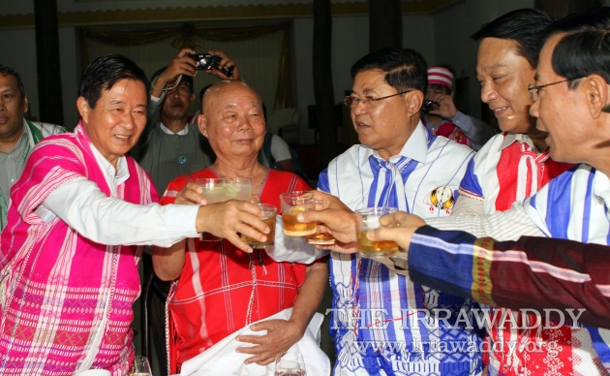The Karen National Union (KNU) has been fighting for greater autonomy for more than 60 years, yet some of our leaders threw away our rights in just a few hours, said the group’s vice-president, David Takapaw, in reference to the January signing of a ceasefire between the KNU and the Burmese government.
He said he feels his organization—which is fractured with ideological rifts—is rushing into a historic accord, but that he, and several other Karen leaders, still harbor grave doubts over the sincerity of the government.
“The KNU has actually called a ceasefire six times, but five of them failed,” said Takapaw. “The government is never sincere about finding a political solution for the ethnic groups.”
Takapaw said his complaint is compounded by the fact that just one day after the two sides reached a ceasefire agreement on Jan. 12, battalions of Burmese troops moved in to reinforce army bases, and additional military supplies were sent to frontline positions.
The KNU’s military wing, the Karen National Liberation Army (KNLA), remains on alert, especially in Brigade 5, northern Karen State, where the Burmese army are frequently forced to withdraw from frontline positions when they run out of supplies or their supply lines are cut.
This year, however, the KNLA in Brigade 5 watches on—bound by the truce—as the Tatmadaw [Burmese army] doubles its supplies and weapons to its units in the area.
Officers from KNU Brigade 5, as well as Karen community leader, refugees, internally displaced persons, NGOs and health workers have also expressed skepticism over the government’s intentions.
An NGO worker who works with border-based Karen community groups echoed Takapaw’s sentiment: “If the Tatmadaw has called a ceasefire, why is it sending more troops, more weapons and more ammunition into the war zone?”
Several low-ranking KNLA officers have expressed the opinion that although Naypyidaw’s lead negotiator Aung Min appears a friendly and sincere person, he is prone to making promises that he may or may not be in a position to keep.
Aung Min and his delegation last week held informal talks in Mae Sot with KNU General-Secretary Zipporah Sein and other KNU representatives. Karen sources said the meeting centered on the withdrawal and reposition of Burmese government troops within KNU-controlled areas.
Aung Min’s peace team has now signed ceasefire agreements with no less than 10 ethnic armed groups, including major players the KNU and the Shan State Army–South (SSA-South).
Takapaw is again dismissive of Naypyidaw’s motives. “All they want are signatures to show off to the international community for the purpose of getting sanctions lifted,” he said. “That’s certainly the feeling I get.
“We have to be prepared. The ceasefire is not durable,” he reiterated, pointing to several other ethnic armies which he said have similar experiences of the Burmese government’s treachery.
In Shan State, there are currently 180 government battalions holding positions, and at least 17 clashes have been reported between the Tatmadaw and the SSA-South since both sides signed a peace agreement in December, according to the Shan Women’s Action Network.
Further north, the Kachin Independence Organization (KIO) reported 64 Burmese army attacks against Kachin military installations in the first two weeks of April alone, and the mass movement of heavy artillery into the area around the KIO’s Laiza headquarters. About 60,000 people have been displaced since conflict broke out in June last year following the breakdown of a 19-year-old ceasefire.
And in Karenni State, conflict has broken out once again between the Karenni National Progressive Party (KNPP) and the Tatmadaw; KNPP claims that five Burmese soldiers were killed on June 29 during clashes in Karenni State.
Of course, many observers say that business interests lay at the heart of the peace talks. During his recent visit to Mae Sot, Aung Min was accompanied by a number of representatives from Dawei Princess, Ital-Thai’s Burmese partner on the Dawei deep-sea port project.
Takapaw complains that the resource-hungry international community is exerting pressure on the KNU to engage with Naypyidaw.
“Many INGOs have asked us to cooperate with the government,” he said. “They tell us: ‘You never win, so why fight? Cooperate with the government and initiate development.’
“To me, development has become the new ideology,” he remarked. “It is supported by those people who want to turn Burma into a marketplace in a hurry.”
According to the exile activist group Burma Partnership, there has be no consistency in the points made by the government’s negotiation teams and still no willingness to discuss the political aspirations of ethnic nationalities.
In Thein Sein’s speech on the first anniversary of his government’s inauguration, he explained that the only stage at which the government would allow political discussions is when ethnic groups form political parties and are elected to the Parliament.
Burma Partnership says that this is a crucial time for the international community to support the political aspirations of Burma’s ethnic nationalities and their calls for equality, self-determination, and an end to armed conflict and human rights violations.
“For us ethnic nationalities, we want a political settlement,” said Takapaw. “We want to see the Constitution become democratic. We want a win-win solution.”

















